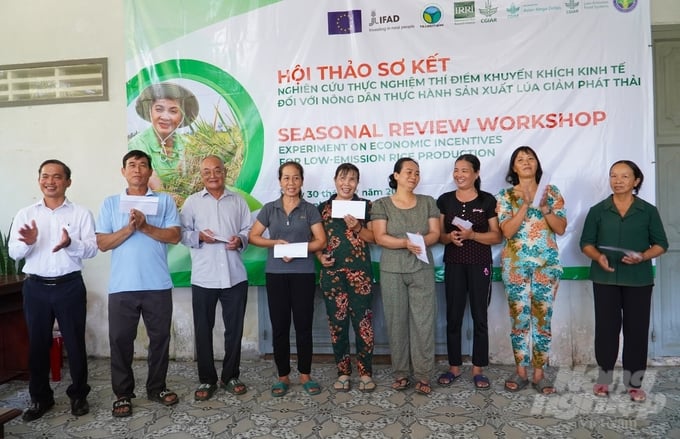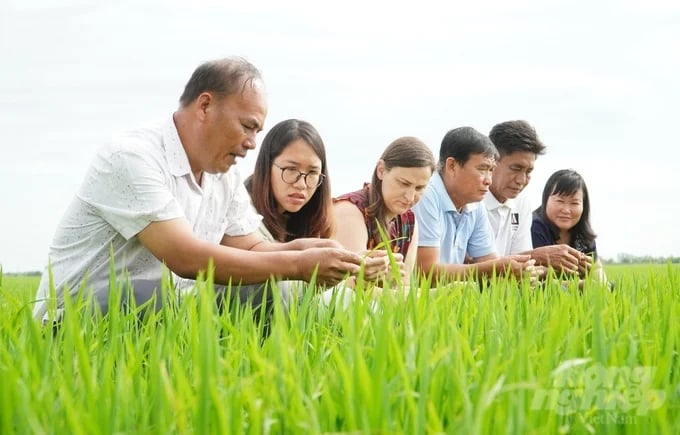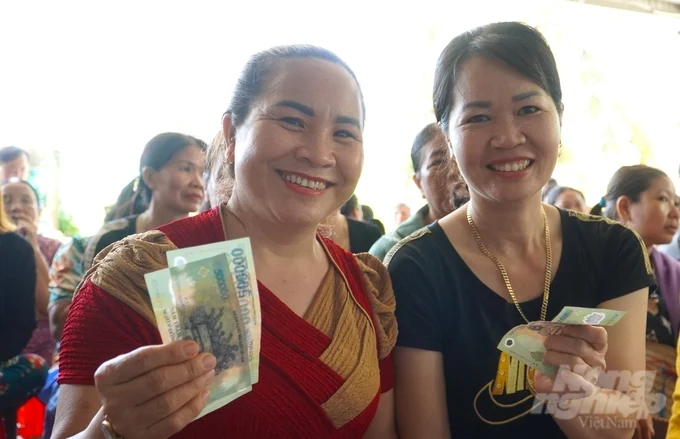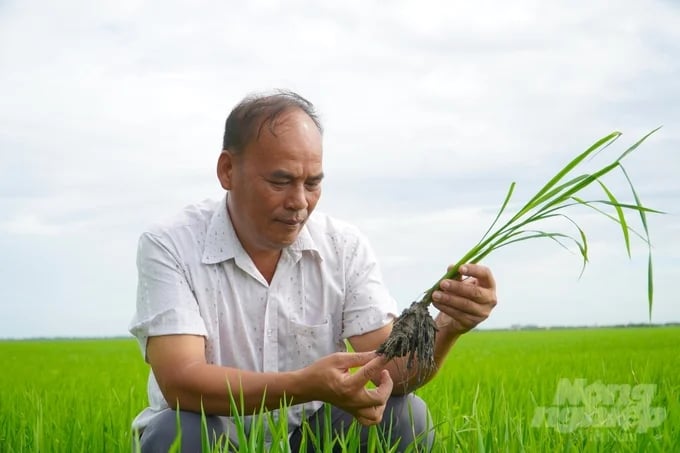May 22, 2025 | 15:51 GMT +7
May 22, 2025 | 15:51 GMT +7
Hotline: 0913.378.918
May 22, 2025 | 15:51 GMT +7
Hotline: 0913.378.918
To promote the application of ecologically efficient and sustainable rice production techniques, Can Tho City Department of Crop Production and Plant Protection has coordinated with the International Rice Research Institute (IRRI) to conduct a pilot experiment. This pilot experiment encourages economic incentives for farmers to practice rice production according to the 1 must 5 farming package to reduce greenhouse gas emissions.
This research is within the framework of the Project “Transforming ecological agriculture to build inclusive and resilient agriculture and food systems”.

Farmers are excited to receive bonuses from a pilot experimental research program that encourages economic incentives for farmers practicing rice production according to the 1 must 5 farming package to reduce and reduce greenhouse gas emissions. Photo: Kim Anh.
On July 30, the two units conducted a preliminary summary of experimental research. At the event, 38 farming households were selected to receive pilot awards for this research activity. This is the first time in our country that rice farmers who reduce CO2 emissions receive official cash rewards.
Specifically, 30 households achieved emission reduction of less than 1 ton of CO2 equivalent/ha and 8 households achieved emission reduction of over 1 ton of CO2 equivalent/ha, with a total bonus of over 797 USD.
This bonus is a source of encouragement for farmers directly participating in rice farming towards quality rice production, reducing emissions, and reducing environmental pollution.
4 cooperatives Khiet Tam, Quynh Phuc, Hieu Binh and Thinh Phat (each cooperative has 50 farmers) were selected to participate in the research, from December 2023 - April 2024.
Research activities include: training 200 cooperative farmers on sustainable, low-emission rice production techniques. At the same time, conduct a survey at the beginning of the term (winter-spring 2022 - 2023) and a survey at the end of the term (winter-spring 2023 - 2024), to compare the level of technical application and emission reduction.

Growing rice in the direction of reducing emissions helps members of Khiet Tam Cooperative increase profits by 15 - 20% compared to traditional farming. Photo: Kim Anh.
At the same time, agricultural technical staff from Vinh Thanh District Crop Production and Plant Protection Station and farmers participating in the study were introduced to the FarMoRe tool.
This is a digital tool that serves to record data and evaluate the results of sustainable and low-emission rice farming. Through the FarMoRe tool, farmers better understand the impact of farming practices on greenhouse gas emissions.
Thereby, people have more knowledge and experience in applying advanced rice farming practices, suitable for local soil conditions but still ensuring productivity.
The FarMoRe tool also helps technical staff monitor and understand details of farmers' farming practices through each crop, thereby providing more appropriate technical advice.
Furthermore, recording practices and evaluating rice production results using digital tools will potentially lead to high-value rice markets, requiring tracking data and demonstrating meeting high quality standards for farmers.

Bonuses are a source of encouragement for farmers to directly participate in rice cultivation to reduce emissions. Photo: Kim Anh.
In addition, all farmers participating in the study applied the "1 must" principle of using certified seeds; more than 40 farmers have reduced the amount of seeds and chemical fertilizers; 100% of farmers apply alternating wet and dry irrigation and use combine harvesters.
According to experts from IRRI, emission reduction results are mainly achieved from reducing the use of nitrogen fertilizer, burning straw and applying alternating wet and dry irrigation techniques.
Directly farming according to the emission reduction process, Mr. Nguyen Ngoc Huan, Director of Khiet Tam Cooperative, assessed that the amount of seeds sown by cooperative members has decreased from 150 - 180kg/ha to 80kg/ha. In addition, reduce the amount of chemical fertilizers by 10 - 15% and the amount of pesticides by about 20%.
In particular, the process contributes to changing farmers' awareness of handling straw after harvest. Instead of burning the straw, cooperative members roll it up and take it out of the field, selling it for 15,9 USD/ha. It not only helps rice plants reduce organic poisoning, but also increases income or reuses straw to compost as fertilizer or grow mushrooms.

The emission reduction results are mainly due to reducing the use of nitrogen fertilizer, reducing straw burning and applying alternating wet and dry irrigation techniques. Photo: Kim Anh.
Since then, rice cultivation reduces emissions, helping members of Khiet Tam Cooperative increase profits by 15 - 20% compared to traditional farming.
This survey activity helps farmers become familiar with sustainable and environmentally friendly rice farming methods. Thereby, actively contributing to the implementation of the Project of 1 million hectares specializing in high-quality, low-emission rice cultivation associated with green growth in the Mekong Delta, in which Can Tho City is one of 12 participating localities.
Translated by Phuong Linh
![Reducing emissions from rice fields: [2] Farmers’ commitment to the soil](https://t.ex-cdn.com/nongnghiepmoitruong.vn/608w/files/news/2025/05/05/dsc08881jpg-nongnghiep-140632.jpg)
(VAN) Clean rice cultivation model in Thuong Tan commune, Bac Tan Uyen district, is assisting local residents in achieving sustainable agriculture by substantially reducing costs, increasing productivity, and protecting the environment.

(VAN) At the conference to disseminate Resolution No. 68, AgriS introduced its digital agricultural ecosystem and reaffirmed its commitment to accompanying the Government in promoting private sector development and sustainable agriculture.

(VAN) 'Blue Ocean - Blue Foods' initiative is designed to restore marine ecosystems and establish sustainable livelihoods for local communities by cultivating a minimum of 1,000 hectares of cottonii seaweed in the first three years.
/2025/05/21/4642-3-112707_603.jpg)
(VAN) The V-SCOPE project has made direct contributions to three out of six pillars of the Comprehensive Strategic Partnership between Vietnam and Australia.

(VAN) Facing the threat of rabies spreading to the community, Gia Lai province urgently carries out measures to vaccinate dogs and cats on a large scale.

(VAN) Disease-free livestock farming not only protects livestock herds but also stabilizes production and livelihoods for many farmers in Tuyen Quang.

(VAN) Japan's grant aid project contributes to capacity building, promoting organic agricultural production, and fostering sustainable community development in Dong Thap province.